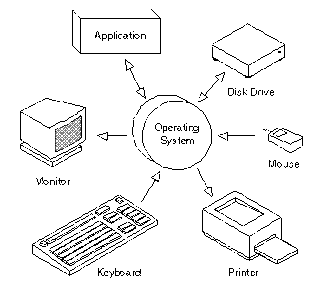A computer is a digital electronic device. Hence to perform vaoius operatings it can accept commands only in digital form. There is a need to have an organized collection of programme that controls the over all operations of a computer. Thus software that enables the communication between the user and the computer system as a whole is called an operating system. It interprets the users commands into a language which the machine can understand, and executes the instructions and helps the computer to handle vaious peripheral devices such as keyboard, monitor, floppy disk drive, hard disk drive, the printer and the other devices. For example, the operating system must monitor the keyboard to determine when a key has been pressed to provide input to the computer. It must also manage the monitor screen and printer to provide output from the computer. The operating system provides link between the user and the computer and enables the user to have complete control over the computer system by giving certain commands from the keyboard or any other input device. The operating system is a set of system programme, known as control programme or supervisor, which resides all the times in the memory (RAM) of a computer and controls all the comonents of a computer system as soon as computer is turned on. Through the use of operating system, the user delegates part of his burden of data processing to the computer itself to achieve high efficiencies of which the processing systems are capable.
FUNCTIONS OF THE OPERATING SYSTEM
According to the facilities provided by operating systems, these range from simple systems to complex ones. The philosophy underlying the operating system is that the computer should perform such jobs of an operator, which it can do faster and more accurately. The operating system remaining in the background performs tasks that are essential for the efficient functioning of the computer system such as:
- Controlling Basic Input and Output Devices
- Allocating System Resources
- Managing Storage Space
- Maintaining Security
- Detection of Equimpment Failure
Various types of operating system have been developed to provide the computer user with a workable system for different purposes such as multiprogramming, multiprocessing, batch processing, remote processing, etc.
continue..WHAT IS OPERATING SYSTEM

No comments:
Post a Comment